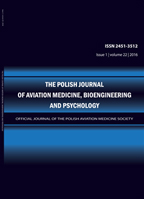2014, Volume 20, Issue 2
Selected Personality Characteristics and Coping with Stress Strategies
Monika Maria Małkiewicz1
-------------------------------------------------------------------------------------------------
1Department of Stress and Work Psychology, Institute of Psychology, Cardinal Stefan Wyszynski University in Warsaw
Autor korenspondencyjny: Monika Maria Małkiewicz; Department of Stress and Work Psychology, Institute of Psychology, Cardinal Stefan Wyszynski University in Warsaw; email: malkiewicz.monika[at]wp.pl
Full text
Streszczenie
Introduction: The aim of the study was to verify the correlation between selected personality characteristics and preferred coping strategies in stressful situations as well as to elucidate individual differences in coping strategies with respect to the personality characteristics of the study participants.
Methods: From the group of 331 participants, we selected individuals identified by “enthusiastic” (N = 99) or and “fearful” (N = 101) personality characteristics. Personality traits, dispositions and beliefs were assessed with Polish adaptations of the following psychometric tools: personality traits with the NEO-FFI Personality Inventory by Costa and McCrea; trait-anxiety with the STAI by Spielberg; optimism with the Revised Life Orientation Test (LOT-R) by M.F.Scheier, Ch.S. Carver, and M.W. Bridges; locus of control with the I-E Questionnaire by Rotter; self-efficacy beliefs with the Hope for Success Questionnaire (HFS) by Laguna, Trzebinski and Zieba, based on the Snyder’s hope theory; beliefs in word’s positiveness, meaning and order with the Basic Hope Inventory (BHI-12) by Trzebinski and Zieba based on the Erikson’s hope theory; and coping strategies with the COPE inventory by Carver, Scheier and Weintraub.
Results: The results suggested that individual differences in coping strategies can be explained by personality characteristics.
Discussion: Our study demonstrates that the “enthusiastic” personality characteristics correlate positively with the active coping strategies, planning, positive reinterpretation and growth, as well as with the suppression of competing activities. Furthermore, the “fearful” personality characteristics correlate positively with such strategies as denial, mental disengagement, restraint, and substance use. Moreover, we outline differences in preferred coping strategies between Enthusiastic and Fearful participants.
Conclusions: Selected personality characteristics were significantly associated with the use of particular coping strategies and significantly differentiated them.
Słowa kluczowe
strategies of coping with stress, personality, anxiety, optimism, locus of control, self-efficacy, beliefs in word’s positiveness, meaning and order, hope
